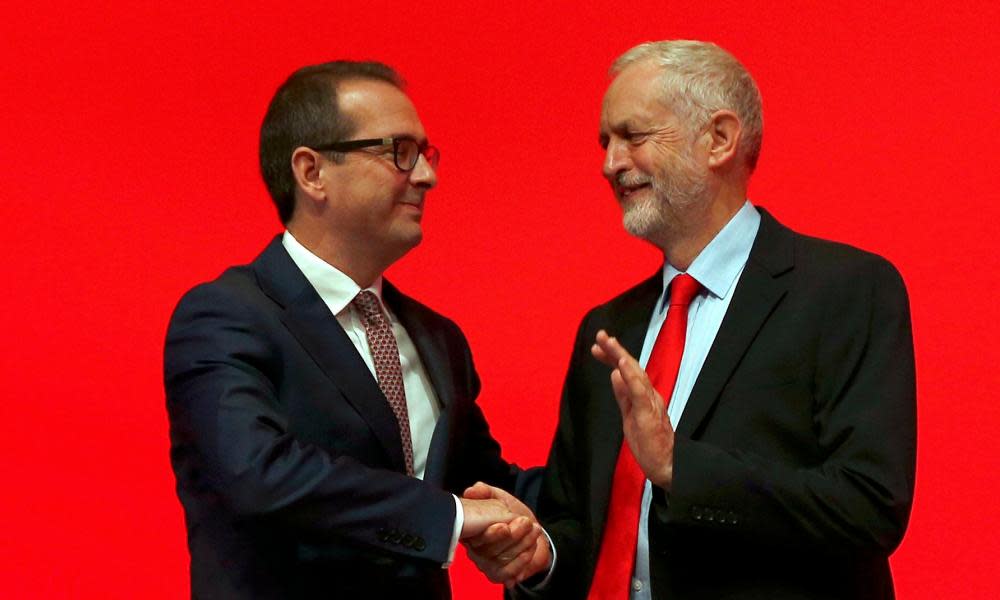Owen Smith calls for referendum on final Brexit deal

Owen Smith has broken ranks with Jeremy Corbyn to reopen the question of whether Brexit is “the right choice for the country”, and urge Labour to offer the public a referendum on the final deal.
The shadow Northern Ireland secretary, who challenged Corbyn for his party’s leadership in 2016, was brought on to the Labour frontbench after last year’s general election.
He has argued strongly for Labour to back a customs union with the EU27, something that has now become party policy, but in an article for the Guardian, Smith says his party can only “serve democracy”, by recommending a poll on the Brexit deal.
“Labour needs to do more than just back a soft Brexit or guarantee a soft border in Ireland,” he argues.
“Given that it is increasingly obvious that the promises which the Brexiters made to the voters, especially, not only their pledge of an additional £350m a week for the NHS, are never going to be honoured, we have the right to ask if Brexit remains the right choice for the country. And to ask, too, that the country has a vote on whether to accept the terms and true costs of that choice once they are clear,” he says.
His intervention will reopen the split in Labour ranks, which has seen a series of rebellions in parliament since the referendum, including over customs union membership and the decision to trigger article 50, the formal process for leaving the European Union.
It is understood that Smith will probably be called in by Corbyn’s team and reminded of his responsibilities as a shadow cabinet member.
Similarly remain-minded Labour MPs were quick to praise Smith, with Chuka Umunna calling his argument “excellent”. Peter Kyle, the Hove MP, tweeted: “It’s a brave piece by a frontbencher, but this is exactly the time for bravery.”
The government’s dead-end Brexit nicely laid bare by @OwenSmith_MP today.
It’s a brave piece by a frontbencher, but this is exactly the time for bravery https://t.co/hMgFhs4Y7n— Peter Kyle MP (@peterkyle) March 23, 2018
After a fraught internal discussion, Corbyn recently announced that the frontbench had agreed on a carefully worded compromise drawn up by the shadow Brexit secretary, Keir Starmer, which would see Britain remain in “a customs union” with the EU, and demand to be consulted on future trade deals with third countries.
Demanding a second referendum was the most distinctive policy position on which Smith fought his leadership bid.
He was convincingly defeated by Corbyn, but his views may chime with the party’s pro-remain base. When polled, members are strongly in favour of remaining in the single market and the customs union – and many would like to see Brexit stopped.
Corbyn has repeatedly insisted it is not Labour’s policy to offer voters a chance to consider the final Brexit deal at the ballot box – though he argues that if Theresa May loses the key vote in parliament on the agreement she would have little choice but to call a general election.
Smith says remaining in both the customs union and the single market are the only way of preventing what he warns would be the “hardest ever” border in Ireland.
“The damage a disorderly and ill-thought-out Brexit could do in Ireland is enormous. We are often told Brexit threatens to ‘reimpose’ a so-called hard border on the island of Ireland, but that understates the problem. Because the economic border that a hard Brexit would create on Ireland would be the hardest ever,” he says.
“If we insist on leaving the EU then there is realistically only one way to honour our obligations under the Good Friday agreement and that is to remain members of both the customs union and the single market. I’m pleased my party has taken a big step in this direction by backing continued customs union membership, but we need to go further.”
His remarks are likely to embolden members of the vociferous backbench campaign for Labour to support single market membership, chaired by MPs Heidi Alexander and Alison McGovern.
The policy of offering voters a say on the final Brexit deal has been championed by the Liberal Democrats. But at last year’s general election it appeared to have little traction with the public. The party, led at the time by Tim Farron, did increase its showing in parliament, from nine to 12 seats, but failed to make the gains it had anticipated by taking a vocal anti-Brexit stance.

 Yahoo News
Yahoo News 
